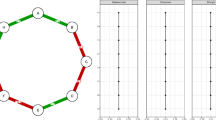Abstract
In this paper, a simple probabilistic model of coalition formation provides a unified interpretation for several extensions of the Shapley value. Weighted Shapley values, semivalues, weak (weighted or not) semivalues, and the Shapley value itself appear as variations of this model. Moreover, some notions that have been introduced in the search of alternatives to Shapley’s seminal characterization, as ‘balanced contributions’ and the ‘potential’ are reinterpreted from this point of view. Natural relationships of these conditions with some mentioned families of ‘values’ are shown. These reinterpretations strongly suggest that these conditions are more naturally interpreted in terms of coalition formation than in terms of the classical notion of ‘value.’
Similar content being viewed by others
References
Calvo E, Santos JC (1997) Potentials in cooperative TU-games. Math Soc Sci 34:175–190
Calvo E, Santos JC (2000) Weighted weak semivalues. Int J Game Theory 29:1–9
Dubey P, Neyman A, Weber RJ (1981) Value theory without efficiency. Math Oper Res 6:122–128
Einy E (1987) Semivalues of simple games. Math Oper Res 12:185–192
Hart S, Mas-Colell A (1989) Potential, value and consistency. Econometrica 57:589–614
Kalai E, Samet D (1987) On weighted Shapley values. Int J Game Theory 16:205–222
Laruelle A, Valenciano F (2002) Power indices and the veil of ignorance. Int J Game Theory 31:331–339
Laruelle A, Valenciano F (2003) Semivalues and voting power. Int Game Theory Rev 5:41–61
Laruelle A, Valenciano F (2005) Assessing success and decisiveness in voting situations. Soc Choice Welf 24:171–197
Myerson R (1980) Conference structures and fair allocation rules. Int J Game Theory 9:169–182
Nash JF (1950) The bargaining problem. Econometrica 18:155–162
Owen G (1975) Multilinear extensions and the Banzhaf value. Nav Res Logist Q 741–750
Owen G (1982) Game theory, 2rd edn. Academic, New York
Roth A (1977a) The Shapley value as a von Neumann–Morgenstern utility. Econometrica 45:657–664
Roth A (1977b) Utility functions for simple games. J Econ Theory 16:481–489
Roth AE (ed) (1988) The Shapley value. Essays in honor of Lloyd S. Shapley. Cambridge University Press, Cambridge
Shapley LS (1953a) Additive and non-additive set functions. PhD thesis, Department of Mathematics, Princeton University
Shapley LS (1953b) A value for n-person games. Ann Math Stud 28:307–317. Reprint in Roth AE (ed) (1988), pp 31–40
Straffin PD (1977) Homogeneity, independence and power indices. Public Choice 30:107–118
Straffin PD (1982) Power indices in politics. In: Brams SJ, Lucas WF, Straffin PD (eds) Political and related models. Springer, New York, pp 256–321
Straffin PD (1988) The Shapley–Shubik and Banzhaf power indices as probabilities. In Roth AE (ed) (1988), pp 71–81
von Neumann J, Morgenstern O (1944) Theory of games and economic behavior. Princeton University Press, Princeton
Weber RJ (1979) Subjectivity in the valuation of games. In: Moeschlin O, Pallaschke D (eds) Game theory and related topics. North-Holland, Amsterdam, pp 129–136
Weber RJ (1988) Probabilistic values for games. In Roth AE (ed), pp 101–119
Author information
Authors and Affiliations
Corresponding author
Rights and permissions
About this article
Cite this article
Laruelle, A., Valenciano, F. Potential, value, and coalition formation. TOP 16, 73–89 (2008). https://doi.org/10.1007/s11750-007-0035-y
Received:
Accepted:
Published:
Issue Date:
DOI: https://doi.org/10.1007/s11750-007-0035-y




